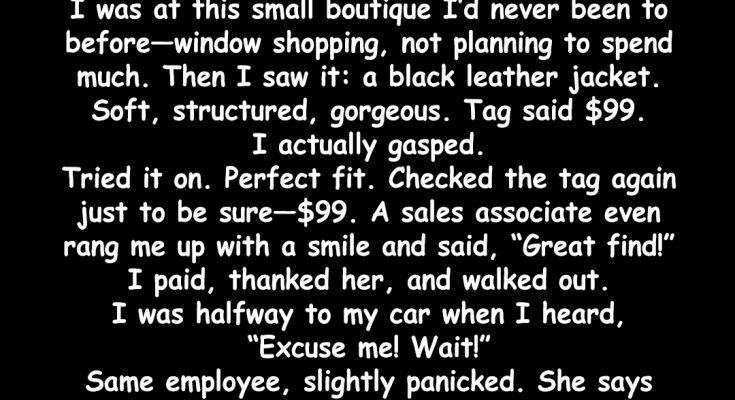She chased me down the sidewalk begging to fix the price—but I’d already swiped my card and walked.
I was at this small boutique I’d never been to before—window shopping, not planning to spend much. Then I saw it: a black leather jacket. Soft, structured, gorgeous. Tag said $99.
I actually gasped.
Tried it on. Perfect fit. Checked the tag again just to be sure—$99. A sales associate even rang me up with a smile and said, “Great find!” I paid, thanked her, and walked out.
I was halfway to my car when I heard, “Excuse me! Wait!”
Same employee, slightly panicked. She says there’s been a mistake—the jacket was actually $299. The tag was wrong.
She asked if I’d please come back in and either pay the difference or return it.
I told her I wasn’t obligated to do either. The tag said $99. The register said $99. Not my fault.
She looked like she was about to cry. Said it would come out of her paycheck. I shrugged. I’d already bought it fair and square. So I ignored her and went home.
Later that night, I saw on the boutique’s Instagram something about “staff retraining” and “policy violations.” People were fuming in the comments. The employee said what happened and released my name.
Now I can’t stop wondering… was I technically right, but morally…
The next day, I woke up to—
A message from my cousin. “Girl, what’s going on with your name trending on this boutique’s Insta?” My heart sank.
I clicked the link she sent and scrolled through the comments. Some were saying I scammed the shop. Others defended me, saying if the store made the mistake, it wasn’t my responsibility.
But what really got me was a comment from the girl herself—her name was Tessa. She’d written, “I’m probably going to get demoted for this. My rent was already late. I made one mistake. Just one.”
That part hit me harder than I expected. I wasn’t used to being “the villain” in someone’s story. I kept thinking back to how her hands were shaking when she asked me to come back.
I told myself I’d let it go. But then my sister called. “Hey, did you see the post? You sure you want to keep that jacket? Feels kinda bad.”
By lunch, I couldn’t eat. I just sat there at my kitchen table, jacket still draped over a chair, looking like it didn’t belong in my house.
So I did something I never thought I would—I drove back to the boutique.
It was quiet. A weekday afternoon. The bell over the door jingled as I walked in, jacket over my arm. The girl at the front desk wasn’t Tessa, but she recognized me.
“You’re her,” she said flatly.
“I’d like to speak to the manager,” I replied, trying to stay calm.
A woman came out from the back—older, maybe mid-50s, hair pulled back tight. She looked like she didn’t have time for games.
“I’m here about the jacket,” I began, holding it up. “I saw the post. I didn’t mean to cause all this.”
Her face softened just a bit. “Look, legally, you’re in the clear. But… Tessa’s in trouble. She’s been working double shifts. It was her first month here. She misread the restock tag and put it out at the wrong price.”
“I want to make it right,” I said. “I don’t think someone should lose their job over a piece of clothing.”
She studied me for a moment, then said, “Tessa’s in the back, finishing inventory. You can talk to her if you want.”
I followed her behind the counter and down a short hallway. Tessa was on the floor, folding sweaters. When she saw me, her eyes widened.
“I—I didn’t mean to call you out,” she said quickly. “I was just upset. I didn’t think it would blow up like this.”
“No, I get it,” I said. “Honestly, I should’ve handled it better. I was defensive. But I’ve been thinking about it nonstop.”
She stood up slowly, brushing her knees. “They’re docking my pay for the month. I already had to borrow from my roommate to cover groceries.”
That stung. And I knew what I had to do.
“Can I pay the difference now?” I asked. “I’ll cover the full price if it helps.”
Tessa blinked. “You’d do that?”
“It was never about the money. I just… wasn’t thinking beyond myself.”
She didn’t say anything at first. Then, very quietly, she said, “Thank you.”
We walked back out together. The manager looked surprised, but grateful. I paid the $200 difference, and before I left, I asked for something small—I wanted to leave a note for Tessa.
I scribbled: “You handled this better than I did. Keep your head up. Everyone makes mistakes.”
As I walked out, I felt lighter. But I didn’t expect what came next.
That night, Tessa posted a story on the boutique’s page. She didn’t name me, but she said, “A customer came back today and paid the difference for a jacket she didn’t have to. I still have my job because of her.”
That could’ve been the end of it. But the post got attention. The boutique’s followers shared it, talking about grace and second chances. A local fashion blog picked it up, calling it “a rare moment of kindness in retail.”
A week later, I got a call from the boutique. The manager, whose name I learned was Paula, asked if I wanted to attend a small customer appreciation night they were hosting. “You’re kind of a folk hero now,” she laughed.
I went, mostly to support Tessa. She looked brighter, more confident. I met a few regulars, sipped wine, and even bought a scarf—full price.
Before I left, Paula pulled me aside and said, “You know, after everything, Tessa got promoted. She’s handling customer service now. Turns out, people love her honesty.”
I smiled. “That’s great. She deserves it.”
I walked home that night, scarf around my neck, jacket over my arm, thinking about how easily that story could’ve gone the other way.
We’re all just one moment away from being the villain or the hero in someone else’s day. What matters is what we do after we realize which one we were.
The twist? A few months later, I started volunteering part-time at a women’s career center near my place. One afternoon, I saw Tessa walk in, this time on the other side of the desk. She was leading a workshop about confidence in customer-facing jobs.
She didn’t see me at first. But I stood in the back, watching her talk about owning your mistakes and learning from them.
She ended with, “Sometimes, doing the right thing means going back when you don’t have to. That kind of person changed my life.”
And I realized… I hadn’t just paid for a jacket. I’d invested in someone’s future.
I waved on my way out. She spotted me just in time, smiled, and gave a small nod.
It felt like the kind of moment I’d want someone to remember me by.
So yeah… I bought a $299 jacket for $99. But the real value didn’t come from the tag.
It came from what I did afterward.
If this story made you pause for a second—maybe think about your own “jacket moment”—give it a like or share it. You never know who might need a reminder that doing the right thing is always worth it.

